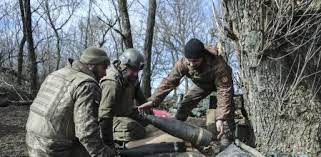Tradition of non-interventionism prompts region’s leftwing leaders to snub pleas from US and Europe.
Please use the sharing tools found via the share button at the top or side of articles. Copying articles to share with others is a breach of FT.com T&Cs and Copyright Policy. Email licensing@ft.com to buy additional rights. Subscribers may share up to 10 or 20 articles per month using the gift article service. More information can be found at https://www.ft.com/tour.
The offer from the US sounded appealing: if Latin American nations donated their ageing Russian-made military kit to Ukraine, Washington would replace it with superior American weaponry.
But far from taking up the US proposal, which was revealed last month by General Laura Richardson, head of the US Southern Command, Latin America’s leaders lined up to denounce it.
“Even if they end up as scrap in Colombia, we will not hand over Russian weapons to be taken to Ukraine to prolong a war,” Colombia’s leftwing president Gustavo Petro responded. “We are not with either side. We are for peace.”
“Brazil has no interest in passing on munitions to be used in the war between Ukraine and Russia,” President Luiz Inácio Lula da Silva said. “Brazil is a country of peace. At this moment, we need to find those who want peace, a word that has so far been used very little.”
Neighboring Argentina took a similar line. “Argentina is not going to co-operate with the war,” said a defense ministry spokesperson. “It is not appropriate to co-operate by sending arms to the conflict in Europe.”
Please use the sharing tools found via the share button at the top or side of articles. Copying articles to share with others is a breach of FT.com T&Cs and Copyright Policy. Email licensing@ft.com to buy additional rights. Subscribers may share up to 10 or 20 articles per month using the gift article service. More information can be found at https://www.ft.com/tour.
Asked whether any Latin American nation had taken up Washington’s offer, Jose Ruiz, a spokesperson for US Southern Command, said it was “our policy not to disclose the particulars of ongoing private discussions with our democratic partners, discuss details about the defense resources of other sovereign nations, or speculate about any support to Ukraine”.
German chancellor Olaf Scholz also came away apparently empty-handed from a recent visit to Brazil, Argentina and Chile, after Lula refused a request to resell tank ammunition to Berlin for use in Ukraine and Argentine president Alberto Fernández, rejected sending arms to Europe. Chile’s president Gabriel Boric, whose leftwing coalition includes pro-Moscow communists, only offered Kyiv help with clearing mines.
Latin America’s unwillingness to provide weaponry for Ukraine stands in sharp contrast to European nations such as Britain, which have been in the vanguard of efforts to supply Kyiv with modern arms. Last week London promised to look into sending fighter jets to Ukraine.
On paper, Latin America’s military could provide valuable weapons for Ukraine. Chile and Brazil’s armies both use the highly regarded German-made Leopard tank that Kyiv is seeking.
Colombia, Peru, Mexico, Argentina, Brazil and Ecuador have all bought Russian-made MiG transport helicopters and in some cases Russian surface-to-air missiles or anti-tank missiles, equipment compatible with that used by Ukraine’s military. Peru is reported to have serviceable MiG and Sukhoi military jets.
However, Latin America’s leftwing presidents view the Ukraine conflict differently to Americans or Europeans.
Hardly any have gone as far as to line up behind Moscow’s three loyal Latin American allies — Cuba, Nicaragua and Venezuela. Most have strongly condemned Russia’s attack on Ukraine. But they disagree with Washington and Brussels on how to end the war, saying the emphasis should be on an immediate ceasefire without preconditions, rather than supplying arms.
“I don’t think sending weapons to prolong a conflict has support in Latin America,” Marcelo Ebrard, Mexico’s foreign minister, told the Financial Times.
“Neither does it seem very intelligent because the costs are going to be very high for the European Union, for Russia and to some degree for everyone else…. the inclination I see in Latin America… is to try to seek or imagine how there could be a political solution to this conflict.”
Mexico’s president Andrés Manuel López Obrador publicly criticized Scholz for agreeing to send Leopard tanks to Ukraine, saying Berlin had been forced to do so against the wishes of most Germans “because of pressure from the German media”.
Christoph Heusgen, head of the Munich Security Conference, said he saw “a certain equidistance in some Latin American countries” over Ukraine.
“They see it differently — as an extension of the east-west conflict, as Russia against the US, or Russia against Europe,” he said. “And my point is that this isn’t about east against west, this is about a violation of the UN Charter, a violation of the rules-based order.”
López Obrador and Petro’s criticisms of western arms shipments to Ukraine were praised by the Russian embassies in their respective countries. But diplomats and foreign policy experts point out that they fit into a long Latin American tradition of non-interference in the affairs of other countries. (https://www.ft.com/content/fc8d51c8-5202-4862-a653-87d1603deded)



































